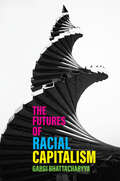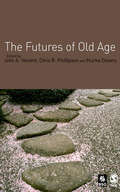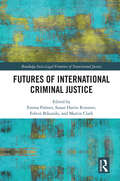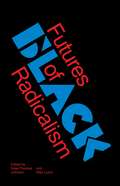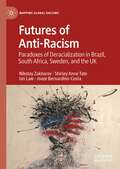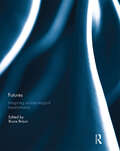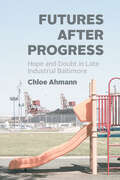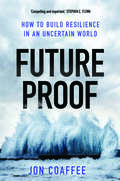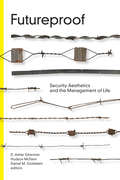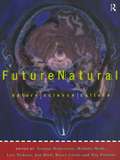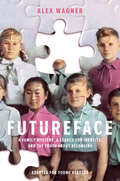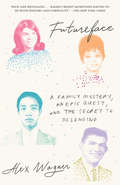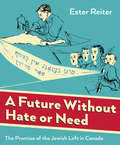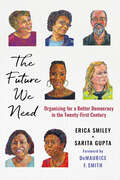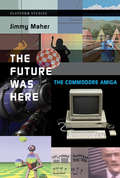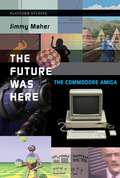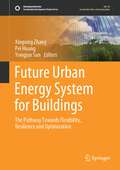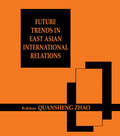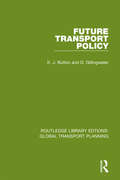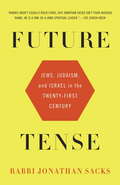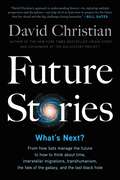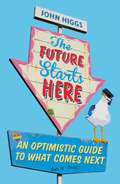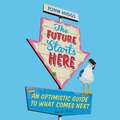- Table View
- List View
The Futures of Racial Capitalism
by Gargi BhattacharyyaCapitalism appears to be endlessly in crisis but without ever loosening its hold on our lives. New modes of racism and exclusion emerge, but the old ones never go away. We continue to struggle to live and survive in its wake but are unable, still now, to build commonality with each other. In this incisive book, Gargi Bhattacharyya revisits debates about racial capitalism and its violence through differentiation. Taking the four lenses of prisons, borders, debt and platforms, Bhattacharyya reveals how this moment of capitalist crisis positions humans as expendable, but differentially so, in a process that remakes longstanding racialized hierarchies. Uncovering practices and techniques embedded in the shifting processes of accumulation and state power, the chapters illuminate how value is extracted from populations through non-wage routes and indebtedness. This engaging introduction to racial capitalism offers an interlocking and insightful analysis of capitalist renewal, essential for students and scholars interested in issues of race, racism and inequality.
The Futures of Old Age
by Chris Phillipson Dr John A Vincent Murna DownsWhat is the future of old age? How will families, services, and economies adapt to an older population? Such questions often provoke extreme and opposing answers: some see ageing populations as having the potential to undermine economic growth and prosperity; others see new and exciting ways of living in old age. The Futures of Old Age places these questions in the context of social and political change, and assesses what the various futures of old age might be. Prepared by the British Society of Gerontology, The Futures of Old Age brings together a team of leading international gerontologists from the United Kingdom and United States, drawing on their expertise and research. The book's seven sections deal with key contemporary themes including: population ageing; households and families; health; wealth; pensions; migration; inequalities; gender and self; and identity in later life.
Futures of International Criminal Justice (Routledge Socio-Legal Frontiers of Transitional Justice)
by Emma Palmer Susan Harris Rimmer Edwin Bikundo Martin ClarkThis collection identifies and discusses problems and opportunities for the theory and practice of international criminal justice. The International Criminal Court and project of prosecuting international atrocity crimes have faced multiple challenges and critiques. In recent times, these have included changes in technology, the conduct of armed conflict, the environment, and geopolitics. The mostly emerging contributors to this collection draw on diverse socio-legal research frameworks to discuss proposals for the futures of international criminal justice. These include addressing accountability gaps and under-examined or emerging areas of criminality at, but also beyond, the International Criminal Court, especially related to technology and the environment. The book discusses the tensions between universalism and localisation, as well as the regionalisation of international criminal justice and how these approaches might adapt to dynamic organisational, political and social structures, at the ICC and beyond. The book will be of interest to students, researchers and academics. It will also be a useful resource for civil society representatives including justice advocates, diplomats and other government officials and policy-makers.
Futures of Black Radicalism
by Alex Lubin Gaye Theresa JohnsonWith racial justice struggles on the rise, a probing collection considers the past and future of Black radicalismBlack rebellion has returned. Dramatic protests have risen up in scores of cities and campuses; there is renewed engagement with the history of Black radical movements and thought. Here, key intellectuals—inspired by the new movements and by the seminal work of the scholar Cedric J. Robinson—recall the powerful tradition of Black radicalism while defining new directions for the activists and thinkers it inspires. In a time when activists in Ferguson, Palestine, Baltimore, and Hong Kong immediately connect across vast distances, this book makes clear that new Black radical politics is thoroughly internationalist and redraws the links between Black resistance and anti-capitalism. Featuring the key voices in this new intellectual wave, this collection outlines one of the most vibrant areas of thought today. With contributions from Greg Burris, Jordan T. Camp, Angela Davis, Ruth Wilson Gilmore, Avery F. Gordon, Stefano Harney, Christina Heatherton, Robin D.G. Kelley, George Lipsitz, Fred Moten, Paul Ortiz, Steven Osuna, Kwame M. Phillips, Shana L. Redmond, Cedric J. Robinson, Elizabeth P. Robinson, Nikhil Pal Singh, Damien M. Sojoyner, Darryl C. Thomas, and Françoise Vergès.
Futures of Anti-Racism: Paradoxes of Deracialization in Brazil, South Africa, Sweden, and the UK (Mapping Global Racisms)
by Nikolay Zakharov Shirley Anne Tate Ian Law Joaze Bernardino-CostaThis book assesses the nature and extent of the project of deracialisation required to counter the contemporary dynamics of racialisation across four varieties of modernity: Sweden, South Africa, Brazil and the UK, based on original research on each of the four country contexts. Since racism began to be recognised or identified as a problem, an assemblage of supra-national initiatives have been devised in the name of combatting, dismantling or reducing it. There has been a recent shift whereby such supra-national bodies move toward embedding strategies against racism within the framework of human rights and devolving such responsibility to other bodies at a national level.The authors bring together a team of international experts in this field, in order to compare the priorities and effectiveness of current strategic approaches in each national context, examining their relationalities and connecting these cases within a joint theoretical and methodological framework. Thus, this book contributes to theoretical knowledge on racialisation and deracialisation, produce a new data set on contemporary interventions and institutions and establish new principles and practice for national projects of deracialisation and anti-racism, building on cross-national learning.
Futures: Imagining Socioecological Transformation
by Bruce BraunFutures: Imagining Socioecological Transformation brings together leading scholars to explore how we might know, enact, and struggle for, the conjoined social and ecological transformations we need to achieve just and sustainable futures. The question of transformation, and how it might be achieved, is explored across a variety of topics and geographical sites, and through heterodox analytical and theoretical approaches, in a collective effort to move beyond a form of critique that hands down judgements, to one that brings new ideas and new possibilities to life. Chapters are lively and original engagements with concrete situations that sparkle with creativity. Together, they add up to an impressive study of how to live, and what to struggle for, in the complex socioecological landscapes of the Anthropocene. This book was previously published as a special issue of the Annals of the Association of American Geographers.
Futures and Fictions
by Simon O'Sullivan Henriette Gunkell Ayesha HameedFutures and Fictions is a book of essays and conversations that explore possibilities for a different ‘political imaginary’ or, more simply, the imagining and imaging of alternate narratives and image-worlds that might be pitched against the impasses of our neoliberal present. In particular, the book contributes to prescient discussions around decolonization, post-capitalism and new kinds of social movements – exploring the intersections of these with contemporary art practice and visual culture. Contributions range from work on science, sonic and financial fictions and alternative space-time plots to myths and images generated by marginalized and ‘minor’ communities, queer-feminist strategies of fictioning, and the production of new Afro- and other futurisms.
Futures after Progress: Hope and Doubt in Late Industrial Baltimore
by Chloe AhmannA powerful ethnographic study of South Baltimore, a place haunted by toxic pasts in its pursuit of better futures. Factory fires, chemical explosions, and aerial pollutants have inexorably shaped South Baltimore into one of the most polluted places in the country. In Futures after Progress, anthropologist Chloe Ahmann explores the rise and fall of industrial lifeways on this edge of the city and the uncertainties that linger in their wake. Writing from the community of Curtis Bay, where two hundred years of technocratic hubris have carried lethal costs, Ahmann also follows local efforts to realize a good future after industry and the rifts competing visions opened between neighbors. Examining tensions between White and Black residents, environmental activists and industrial enthusiasts, local elders and younger generations, Ahmann shows how this community has become a battleground for competing political futures whose stakes reverberate beyond its six square miles in a present after progress has lost steam. And yet—as one young resident explains—“that’s not how the story ends.” Rigorous and moving, Futures after Progress probes the deep roots of our ecological predicament, offering insight into what lies ahead for a country beset by dreams deferred and a planet on the precipice of change.
Futureproof: How to Build Resilience in an Uncertain World
by Jon CoaffeeA compelling and definitive account of why we need to radically rethink our approach to dealing with catastrophic events Catastrophic events such as 9/11, Hurricane Katrina, and the Tohoku "Triple Disaster" of earthquake, tsunami, and nuclear meltdown that hit the eastern seaboard of Japan in 2012 are seen as surprises that have a low probability of occurring but have a debilitating impact when they do. In this eye-opening journey through modern and ancient risk management practices, Jon Coaffee explains why we need to find a new way to navigate the deeply uncertain world that we live in. Examining how governments have responded to terrorist threats, climate change, and natural hazards, Coaffee shows how and why these measures have proven inadequate and what should be done to make us more resilient. While conventional approaches have focused on planning and preparing for disruptions and enhanced our ability to "bounce back," our focus should be on anticipating future challenges and enhancing our capacity to adapt to new threats.
Futureproof: Security Aesthetics and the Management of Life (Global Insecurities)
by D. Asher Ghertner Hudson McFann Daniel M. GoldsteinSecurity is a defining characteristic of our age and the driving force behind the management of collective political, economic, and social life. Directed at safeguarding society against future peril, security is often thought of as the hard infrastructures and invisible technologies assumed to deliver it: walls, turnstiles, CCTV cameras, digital encryption, and the like. The contributors to Futureproof redirect this focus, showing how security is a sensory domain shaped by affect and image as much as rules and rationalities. They examine security as it is lived and felt in domains as varied as real estate listings, active-shooter drills, border crossings, landslide maps, gang graffiti, and museum exhibits to theorize how security regimes are expressed through aesthetic forms. Taking a global perspective with studies ranging from Jamaica to Jakarta and Colombia to the U.S.-Mexico border, Futureproof expands our understanding of the security practices, infrastructures, and technologies that pervade everyday life. Contributors. Victoria Bernal, Jon Carter, Alexandra Demshock, Zaire Z. Dinzey-Flores, Didier Fassin, D. Asher Ghertner, Daniel M. Goldstein, Rachel Hall, Rivke Jaffe, Ieva Jusionyte, Catherine Lutz, Alejandra Leal Martínez, Hudson McFann, Limor Samimian-Darash, AbdouMaliq Simone, Austin Zeiderman
Futurenatural: Nature, Science, Culture (FUTURES: New Perspectives for Cultural Analysis)
by George Robertson Melinda Mash Lisa Tickner Jon Bird Barry Curtis Tim PutnamWe are living in an age when 'nature' seems to be on the brink of extinction yet, at the same time, 'nature' is becoming increasingly ubiquitous and unstable as a category for representation and debate.Futurenatural brings together leading theorists of culture and science to discuss the concept of 'nature' - its past, present and future. Contributors discuss the impact on our daily life of recent developments on biotechnologies, electronic media and ecological politics. Increasingly, scientific theories and models have been taken up as cultural metaphors that have material effects in transforming 'ways of seeing' and 'structures of feeling'.The book addresses the issue of whether political and cultural debates about the body and environment can take place without reference to 'nature' or the 'natural'. This collection considers how we might 'think' a future developing from emergent scientific theories and discourses. What cultural forms may be produced when new knowledges challenge and undermine traditional ways of conceiving the 'natural'.
Futureface (Adapted for Young Readers): A Family Mystery, a Search for Identity, and the Truth About Belonging
by Alex WagnerFor anyone who is interested in genealogy and DNA profiling, this is the story of a journalist who travels the world to solve the mystery of her ancestry, facing questions about American identity and what it means to belong. Now adapted for young readers from the acclaimed adult memoir.Who are my people? Where am I from? With a Burmese mother and a white American father, Alex Wagner grew up thinking of herself as a "futureface"--an example of what the mixed-race future of America would look like. Her father's ancestors immigrated to the United States from Ireland and Luxembourg. Her mother fled Burma--now Myanmar--with her family in the 1960s.When Alex learns that her ancestry might be more mysterious than she believed, she becomes obsessed with learning everything there is to know about her ethnic and racial history. Her journey takes her from Burma to Luxembourg, from birth records written on banana leaves to high-tech genetic labs and online ancestry profiles.Through a blend of history, science, and sociology, Alex tries to solve the mysteries of her family and what it means to be American. What makes us think of certain people as "us" and others as "them"? In a time of conflict over who we are as a country, she tries to find the story where we all belong.Praise for the adult edition of Futureface"A thoughtful, beautiful meditation on what makes us who we are." --Barack Obama"Smart, timely, and moving." --Eddie Huang, bestselling author of Fresh Off the Boat"A rich and revealing memoir." --The New York Times
Futureface: A Family Mystery, an Epic Quest, and the Secret to Belonging
by Alex Wagner<P>An acclaimed journalist travels the globe to solve the mystery of her ancestry, confronting the question at the heart of the American experience of immigration, race, and identity: Who are my people? <P>Alex Wagner has always been fascinated by stories of exile and migration. Her father’s ancestors immigrated to the United States from Ireland and Luxembourg. Her mother fled Rangoon in the 1960s, escaping Burma’s military dictatorship. <P>In her professional life, Wagner reported from the Arizona-Mexico border, where agents, drones, cameras, and military hardware guarded the line between two nations. She listened to debates about whether the United States should be a melting pot or a salad bowl. <P>She knew that moving from one land to another—and the accompanying recombination of individual and tribal identities—was the story of America. And she was happy that her own mixed-race ancestry and late twentieth-century education had taught her that identity is mutable and meaningless, a thing we make rather than a thing we are. <P>When a cousin’s offhand comment threw a mystery into her personal story–introducing the possibility of an exciting new twist in her already complex family history—Wagner was suddenly awakened to her own deep hunger to be something, to belong, to have an identity that mattered, a tribe of her own. <P>Intoxicated by the possibility, she became determined to investigate her genealogy. So she set off on a quest to find the truth about her family history. <P>The journey takes Wagner from Burma to Luxembourg, from ruined colonial capitals with records written on banana leaves to Mormon databases and high-tech genetic labs. <P>As she gets closer to solving the mystery of her own ancestry, she begins to grapple with a deeper question: Does it matter? Is our enduring obsession with blood and land, race and identity, worth all the trouble it’s caused us? <P>The answers can be found in this deeply personal account of her search for belonging, a meditation on the things that define us as insiders and outsiders and make us think in terms of “us” and “them.” <P>In this time of conflict over who we are as a country, when so much emphasis is placed on ethnic, religious, and national divisions, Futureface constructs a narrative where we all belong.
Future Youth: How to Reverse the Aging Process
by Carol KeoughA guide for those who want to stay young, that provides information on all the good food readers should eat, and what they should not. Exercise is another way of staying healthy and young, and this book provides the techniques.
A Future Without Hate or Need: The Promise of the Jewish Left in Canada
by Ester ReiterDriven from their homes in Russia, Poland, and Romania by pogroms and poverty, many Jews who came to Canada in the wave of immigration after the 1905 Russian revolution were committed radicals. A Future Without Hate or Need brings to life the rich and multi-layered lives of a dissident political community, their shared experiences and community-building cultural projects, as they attempted to weave together their ethnic particularity—their identity as Jews—with their internationalist class politics.
The Future We Need: Organizing for a Better Democracy in the Twenty-First Century
by Erica Smiley Sarita GuptaIn The Future We Need, Erica Smiley and Sarita Gupta bring a novel perspective to building worker power and what labor organizing could look like in the future, suggesting ways to evolve collective bargaining to match the needs of modern people—not only changing their wages and working conditions, but being able to govern over more aspects of their lives.Weaving together stories of real working people, Smiley and Gupta position the struggle to build collective bargaining power as a central element in the effort to build a healthy democracy and explore both existing levers of power and new ones we must build for workers to have the ability to negotiate in today and tomorrow's contexts. The Future We Need illustrates the necessity of centralizing the fight against white supremacy and gender discrimination, while offering paths forward to harness the power of collective bargaining in every area for a new era.
The Future Was Here: The Commodore Amiga (Platform Studies)
by Jimmy MaherExploring the often-overlooked history and technological innovations of the world's first true multimedia computer.Long ago, in 1985, personal computers came in two general categories: the friendly, childish game machine used for fun (exemplified by Atari and Commodore products); and the boring, beige adult box used for business (exemplified by products from IBM). The game machines became fascinating technical and artistic platforms that were of limited real-world utility. The IBM products were all utility, with little emphasis on aesthetics and no emphasis on fun. Into this bifurcated computing environment came the Commodore Amiga 1000. This personal computer featured a palette of 4,096 colors, unprecedented animation capabilities, four-channel stereo sound, the capacity to run multiple applications simultaneously, a graphical user interface, and powerful processing potential. It was, Jimmy Maher writes in The Future Was Here, the world's first true multimedia personal computer.Maher argues that the Amiga's capacity to store and display color photographs, manipulate video (giving amateurs access to professional tools), and use recordings of real-world sound were the seeds of the digital media future: digital cameras, Photoshop, MP3 players, and even YouTube, Flickr, and the blogosphere. He examines different facets of the platform—from Deluxe Paint to AmigaOS to Cinemaware—in each chapter, creating a portrait of the platform and the communities of practice that surrounded it. Of course, Maher acknowledges, the Amiga was not perfect: the DOS component of the operating systems was clunky and ill-matched, for example, and crashes often accompanied multitasking attempts. And Commodore went bankrupt in 1994. But for a few years, the Amiga's technical qualities were harnessed by engineers, programmers, artists, and others to push back boundaries and transform the culture of computing.
The Future Was Here: The Commodore Amiga
by Jimmy MaherLong ago, in 1985, personal computers came in two general categories: the friendly, childish game machine used for fun (exemplified by Atari and Commodore products); and the boring, beige adult box used for business (exemplified by products from IBM). The game machines became fascinating technical and artistic platforms that were of limited real-world utility. The IBM products were all utility, with little emphasis on aesthetics and no emphasis on fun. Into this bifurcated computing environment came the Commodore Amiga 1000. This personal computer featured a palette of 4,096 colors, unprecedented animation capabilities, four-channel stereo sound, the capacity to run multiple applications simultaneously, a graphical user interface, and powerful processing potential. It was, Jimmy Maher writes in The Future Was Here, the world's first true multimedia personal computer. Maher argues that the Amiga's capacity to store and display color photographs, manipulate video (giving amateurs access to professional tools), and use recordings of real-world sound were the seeds of the digital media future: digital cameras, Photoshop, MP3 players, and even YouTube, Flickr, and the blogosphere. He examines different facets of the platform--from Deluxe Paint to AmigaOS to Cinemaware--in each chapter, creating a portrait of the platform and the communities of practice that surrounded it. Of course, Maher acknowledges, the Amiga was not perfect: the DOS component of the operating systems was clunky and ill-matched, for example, and crashes often accompanied multitasking attempts. And Commodore went bankrupt in 1994. But for a few years, the Amiga's technical qualities were harnessed by engineers, programmers, artists, and others to push back boundaries and transform the culture of computing.
Future Urban Energy System for Buildings: The Pathway Towards Flexibility, Resilience and Optimization (Sustainable Development Goals Series)
by Xingxing Zhang Pei Huang Yongjun SunThis book investigates three main characteristics of future urban energy system for buildings, including flexibility, resilience and optimization. It explores the energy flexibility by considering renewable energy integration with buildings, sector coupling, and energy trading in the local energy market. Energy resilience is addressed from aspects of future climate change, pandemic crisis, and operational uncertainties. Approaches for system design, dynamic pricing and advanced control are discussed for the optimization of urban energy system. Knowledge from this book contributes to the effective means in future urban energy paradigm to closely integrate multiple energy systems (i.e., distribution, mobility, production and storage) with different energy carriers (i.e., heat, electricity) in an optimal manner for energy use. It would facilitate the envision of next-generation urban energy systems, towards sustainability, resilience and prosperity. This book targets at a broad readership with specific experience and knowledge in energy system, transport, built environment and urban planning. As such, it will appeal to researchers, graduate students, engineers, consultants, urban scientists, investors and policymakers, with interests in energy flexibility, building/city resilience and climate neutrality.
Future Trends in East Asian International Relations: Security, Politics, and Economics in the 21st Century
by Quansheng ZhaoThe world has undergone significant change since the end of the Cold War. One such development is that the Asia-Pacific has become increasingly prominent in international affairs. This comprehensive study provides a detailed understanding of key issues, actors and future trends in the region.
Future Transport Policy: The History Of A Subculture (Routledge Library Edtions: Global Transport Planning #6)
by K. J. Button D. GillingwaterOriginally published in 1986, this book remains as relevant today as when it was first published, as it discusses issues in transport policy that are still being debated: what levels of subsidies should be applied; what form of ownership should prevail; how transport should be regulated or deregulated; and which modes of transport should be favoured. The book examines how policies have evolved, and what factors affect present decision making. It includes contentious areas such as international airline deregulation and urban transport.
Future Tense: Jews, Judaism, and Israel in the Twenty-First Century
by Jonathan SacksOne of the most admired religious thinkers of our time issues a call for world Jewry to reject the self-fulfilling image of "a people alone in the world, surrounded by enemies" and to reclaim Judaism's original sense of purpose: as a partner with God and with those of other faiths in the never-ending struggle for freedom and social justice for all. We are in danger, says Rabbi Jonathan Sacks, of forgetting what Judaism's place is within the global project of humankind. During the last two thousand years, Jews have lived through persecutions that would have spelled the end of most nations, but they did not see anti-Semitism written into the fabric of the universe. They knew they existed for a purpose, and it was not for themselves alone. Rabbi Sacks believes that the Jewish people have lost their way, that they need to recommit themselves to the task of creating a just world in which the divine presence can dwell among us. Without compromising one iota of Jewish faith, Rabbi Sacks declares, Jews must stand alongside their friends--Christian, Muslim, Hindu, Sikh, Buddhist, and secular humanist--in defense of freedom against the enemies of freedom, in affirmation of life against those who desecrate life. And they should do this not to win friends or the admiration of others but because it is what a people of God is supposed to do. Rabbi Sacks's powerful message of tikkun olam--using Judaism as a blueprint for repairing an imperfect world--will resonate with people of all faiths.From the Hardcover edition.
Future Stories: What's Next?
by David ChristianThe New York Times bestselling author of Origin Story, who Bill Gates has &“long been a fan of,&” turns his attention to the future of humanity — and how we think about it — in this ambitious book. The future is uncertain, a bit spooky, possibly dangerous, maybe wonderful. We cope with this never-ending uncertainty by telling stories about the future, future stories. How do we construct those stories? Where is the future, the place where we set those stories? Can we trust our future stories? And what sort of futures do they show us? This book is about future stories and future thinking, about how we prepare for the future. Think of it as a sort of User&’s Guide to the Future. We all need such a guide because the future is where we will spend the rest of our lives. David Christian, historian and author of Origin Story, is renowned for pioneering the emerging discipline of Big History, which surveys the whole of the past. But with Future Stories, he casts his sharp analytical eye forward, offering an introduction to the strange world of the future, and a guide to what we think we know about it at all scales, from the individual to the cosmological. Christian consults theologians, philosophers, scientists, statisticians, and scholars from a huge range of places and times as he explores how we prepare for uncertain futures, including the future of human evolution, artificial intelligence, interstellar travel, and more. By linking the study of the past much more closely to the study of the future, we can begin to imagine what the world will look like in a hundred years and consider solutions to the biggest challenges facing us all.
The Future Starts Here: An Optimistic Guide to What Comes Next
by John HiggsWhen we look into the future, we imagine economic collapse, environmental disaster and the zombie apocalypse. But what if we are wrong? John Higgs takes us on a journey past the technological hype and headlines to discover why we shouldn't trust the predictions of science fiction, why nature is not as helpless as we assume and why purpose can never be automated. In the process, we will come to a better understanding of what lies ahead and how, despite everything we can build a better future.
The Future Starts Here: An Optimistic Guide to What Comes Next
by John HiggsAt some point in the 1980s we gave up on the future. Before then, we imagined wonderful days to come, free from disease, work and want, in television series like Star Trek or events such as the 1939 Futurama World Fair. When we look ahead now, we tell dystopian stories of environmental collapse, zombie plagues and the end of civilisation. If it is true that we have to imagine the future before we build it, then this is deeply worrying.There are of course good reasons for this bleak outlook. Serious environmental and societal problems are building, most notably climate change, inequality and population demographics. These will be accompanied by technological advances, including artificial intelligence and biotechnology, which will amplify the rate of change and make the future increasingly unstable and unpredictable.But it is not just technology that is changing. We are changing too. The postmodern world is evolving into a metamodern one. In the metamodern world concepts previously shunned, such as meaning, purpose and sincerity, return not as absolute truths but as necessary tools. While the postmodern world view was detached, cynical and frequently pessimistic, the metamodern is naturally more optimistic. If we engage with the problems of the world, we can overcome them. John Higgs takes us on a journey to find the individuals who are engaging with the changes that are coming, and through that engagement finding their own sense of purpose. As a result, the characters we meet along the way will not be titans of industry or world-renowned experts, but rather regular people who were curious about new technology and who have begun exploring its potential in ways that are meaningful to them. Through their stories, we will come to understand what this much-hyped new technology can and can't do, in order to see past the hype and headlines. In the process, we will come to a better understanding of what lies ahead and how, despite everything - despite all the horrors and instability we face - we can imagine a future worth building.(p) Orion Publishing Group Ltd 2019
